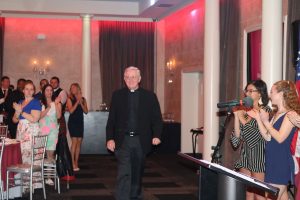Local mother speaks about her immigration journey
November 14, 2018
A New Rochelle mother who, after fleeing Guatemala to escape domestic violence, found sanctuary inside of a church to avoid deportation and being separated from her two children, participated in an interview over Skype on Nov. 6 as part of the Week of the Peacemaker.
Aura Hernandez, a 37-year-old mother of two, has been living in a church called the Fourth Universalist Society in the City of New York for over half a year.
She claimed asylum in March at the Unitarian church which serves as a sanctuary for undocumented immigrants facing deportation.
Dr. Tony Kelso, associate professor and chair of the Mass Communications department, and Dr. Carl Procario-Foley, director of the Office of Mission and Ministry, hosted a Skype interview with Hernandez in Romita Auditorium as part of Iona’s annual Week of the Peacemaker. Junior Olivia Montas translated on Hernandez’s behalf.
Hernandez fled Guatemala in 2005 to escape domestic violence, and her plan was to come to the United States where she could live with her sister in New Rochelle, New York.
Hernandez was asked why she didn’t seek asylum in Guatemala instead of moving to the United States.
“In Guatemala, they don’t protect women at all,” Hernandez said. “I went to the police twice, and each time I went, they said it was a family problem and I had to figure it out myself.”
Hernandez has not left the church since she moved in and is not planning on doing so until she is forced out or is safe from deportation and being separated from her two children.
Hernandez’s 10-year-old son attends elementary school in New Rochelle and visits his mother in the church on the weekends. Her 21-month-old lives in the church with her.
Her journey from Guatemala to Texas included traveling through the mountains on foot, sleeping with wild animals and surviving off of one meal a day and barely any liquids.
“Making it to the border was the most difficult, because being in Mexico and traveling through was the longest time spent in one country,” Hernandez said. “I was trying to hide and stay safe with fellow passengers, and the scariest part of my journey was to keep safe.”
When she arrived at the border by Texas, Hernandez was stripped down, she said. She got one meal per day of two pieces of bread with a slice of cheese, which was green. She was not given anything to drink, and she slept on cement blocks.
“Those three days felt like a lifetime, and I thought they would never end,” Hernandez said.
Hernandez became emotional as she explained her experience at the border when she was 24 years old.
“The most difficult part was the way they treated me,” Hernandez said. “I was abused sexually and physically, and the border patrol made it so you must do as they say or they send you back, so we had to do whatever they wanted to do. It scars me for life, and I really struggle with it.”
She explained that when she reported the sexual abuse, in hopes she could be granted permission to remain in the country, her report was thrown out due to too much time passing since the incident.
Procario-Foley expressed how important hearing from Hernandez was for him.
“I thought it was really powerful to hear directly from Aura, because life experiences teach us a lot,” Procario-Foley said. “And her experiences, how can you begin to relate to them? And to understand, it’s one thing to talk issue-wise here, but when you see someone in her situation, it helps you see it on a whole different level.”
Junior Daisha Reyes shared how the interview affected her because of her family’s experience with immigration.
“It felt very powerful for a woman who migrated through the border to discuss what happened, because it is different when it happens to a man versus to a woman, because there’s a lot more violence,” Reyes said. “[Because of] my aunt and uncle, who have migrated through the border, it’s good to hear that there’s a different story and different side. I do strongly feel for her and really do hope that further down the line, she is able to get her asylum and her papers, because I know the climate that we’re at with Trump.”
The U.S. Immigration and Customs Enforcement agency has stated that it generally avoids arrests at sensitive locations, including places of worship. ICE legally has the right with a warrant to search any building due to the Immigration and Nationality Act, which prohibits anyone from knowingly harboring an undocumented immigrant in any place.
Hernandez has an active deportation order, because she was ordered to go to a Texas courtroom after she was detained by U.S. Customs and Border Patrol and never showed up to her court date. She was not aware of this until 2012, when she was pulled over in Mamaroneck for driving down a road the wrong way.







